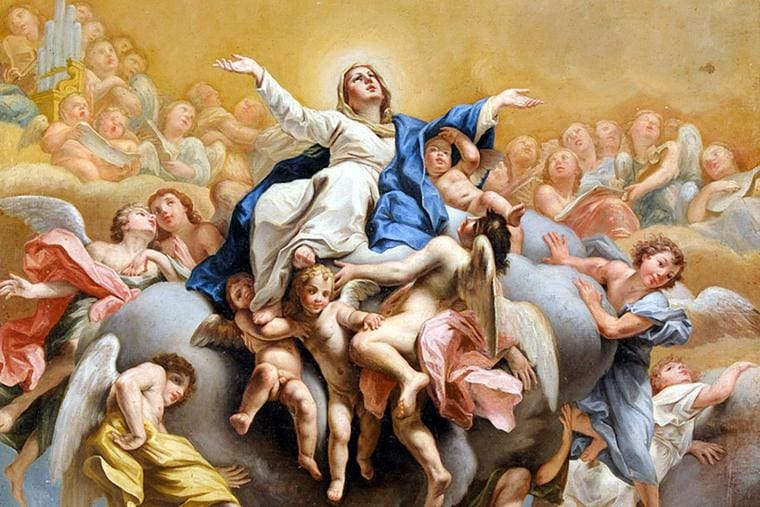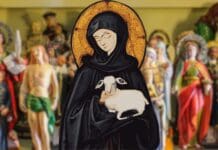The solemnity of the Assumption of the Blessed Virgin Mary is one of the more important feasts in the Catholic liturgical year. But have you ever wondered what this feast is all about? What, after all, is an assumption? And why do we remember the Virgin Mary’s Assumption? Even more importantly, what does it have to do with us?
If you’re confused, you’re not alone. There’s more than a little confusion about this feast and why it’s so important. Let’s take a moment and examine the importance of this feast in the life of the Church, as well as its significance to our own lives.
Being Assumed Into Heaven?
Let’s start with what it means to be assumed into heaven.
Normally, when we talk about “going to heaven” we mean that someone dies naturally and their soul is taken to heaven while their body remains her on earth to be buried. Being assumed into heaven, however, means that you are taken up directly, body and soul, into heaven, bypassing death.
That’s pretty nice, right? Needless to say, though, this is a very rare occurrence. In the Old Testament, only two figures are taken directly into heaven in this way: Enoch and Elijah.
Enoch we know very little about. We do know he lived prior to Noah’s flood, and he lived about 365 years before God took him directly into heaven (see Gen. 5:21-24). He is mentioned a couple of places in the New Testament, including the genealogy of Jesus and the book of Jude, so he was definitely familiar to the Apostles.
The author of the book of Hebrews says, “By faith Enoch was taken so that he did not experience death; and ‘he was not found, because God had taken him.’ For it was attested before he was taken away that ‘he had pleased God.'” (11:5). Enoch, then, was a saintly figure who pleased God and was taken directly, body and soul, into heaven.
Elijah, too, was a holy Old Testament figure, a fiery prophet who worked miracles and even raised a young boy from the dead. Famously, he handed on his prophetic mantle to his disciple Elijah, before being taken in a fiery chariot directly into heaven. Here’s how the book of 2 Kings chapter 2 relates the story:
As they continued walking and talking, a chariot of fire and horses of fire separated the two of them, and Elijah ascended in a whirlwind into heaven. Elisha kept watching and crying out, “Father, father! The chariots of Israel and its horsemen!” But when he could no longer see him, he grasped his own clothes and tore them in two pieces.
There you have it. The only two characters recorded in the Old Testament to be assumed directly into heaven were Enoch and Elijah. So what about the Blessed Virgin Mary’s Assumption?
The Assumption of the Blessed Virgin Mary
Unlike Enoch and Elijah, the assumption of the Blessed Virgin Mary is not recorded directly in scripture. However, Catholics believe in two sources of revelation: scripture and apostolic tradition.
As St. Paul says in 2 Thessalonians 2:15, “So then, brothers and sisters, stand firm and hold fast to the traditions that you were taught by us, either by word of mouth or by our letter.” In this passage, we see St. Paul teaching instructing the early Christians to follow apostolic tradition, both written (scripture) and oral (word of mouth). The truth of the Virgin Mary’s Assumption is recorded in oral tradition, and not directly in scripture.
The Assumption of Mary is recorded by many early Church fathers, both East and West. In Eastern Christianity, church fathers like St. Andrew of Crete, St. John Damascene, and St. Modestus of Jerusalem all attest to the Assumption as an established fact. In Western Christendom, St. Gregory of Tours is one of the first to mention it. However, St. John of Damascus gives one of the clearest witnesses to it among the earliest Christians:
St. Juvenal, Bishop of Jerusalem, at the Council of Chalcedon (451), made known to the Emperor Marcian and Pulcheria, who wished to possess the body of the Mother of God, that Mary died in the presence of all the Apostles, but that her tomb, when opened, upon the request of St. Thomas, was found empty; wherefrom the Apostles concluded that the body was taken up to heaven.
So while the Virgin Mary’s assumption body and soul into heaven is not recorded in the New Testament, it is widely attested to by many Church fathers and was certainly a belief held in common by the early Church! That’s why the Catechism of the Catholic Church (para. 966) confidently teaches:
“Finally the Immaculate Virgin, preserved free from all stain of original sin, when the course of her earthly life was finished, was taken up body and soul into heavenly glory, and exalted by the Lord as Queen over all things, so that she might be the more fully conformed to her Son, the Lord of lords and conqueror of sin and death.”
The Assumption of the Blessed Virgin is a singular participation in her Son’s Resurrection and an anticipation of the resurrection of other Christians: In giving birth you kept your virginity; in your Dormition you did not leave the world, O Mother of God, but were joined to the source of Life. You conceived the living God and, by your prayers, will deliver our souls from death.
What Does It All Mean?
You might be wondering by now what this all has to do with us and with our spiritual lives. It’s a fair question.
The most important gift of Mary’s assumption is that of hope. After all, we are promised that, through Christ’s death and resurrection, we too can look forward to our own resurrection and participation in eternal life. The Virgin Mary is the first to experience that promise!
She was the first one to experience the gift of eternal life as a result of her relationship with Christ. She was the first one to experience the joys of heaven as a result of Christ’s sacrifice, and because of his empty tomb, her tomb was empty too!
As the Catechism of the Catholic Church says in the paragraph quoted above, “The Assumption of the Blessed Virgin is a singular participation in her Son’s Resurrection and an anticipation of the resurrection of other Christians.” Because she was taken body and soul into heaven, we can have a confident hope that we too will share the same destiny. Death was conquered by Christ on the cross, and the Virgin Mary’s assumption proves it.
The second important truth about Mary’s assumption is that she was taken up soul and body into heaven. The world often devalues our bodies, and even Christians sometimes overemphasize the soul to the neglect of the body. But the truth is, God made our bodies and they are an essential part of us. We profess in the creed that we believe in the resurrection of the body, and the Virgin Mary’s Assumption is a promise that someday, we too will be body and soul in heaven with our resurrection bodies.
Finally, the Virgin Mary’s assumption reminds us of the truth that we have Mary, the Mother of God, as our intercessor and advocate in heaven. We can call on her and ask her to intercede for us anytime, anywhere. What could be better than this?
A happy feast of the Assumption of the Blessed Virgin Mary to all!

















